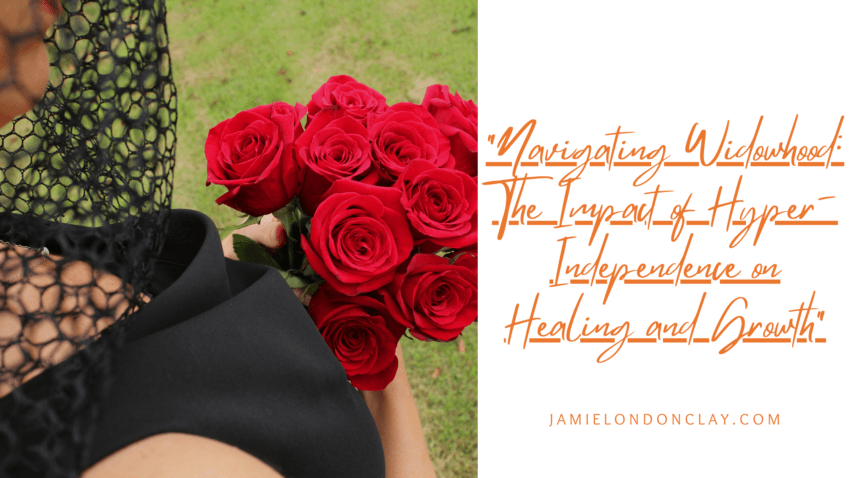
Navigating Widowhood: The Impact of Hyper-Independence on Healing and Growth
Explore the profound effects of hyper-independence on widows and how embracing holistic development can lead to empowerment and wholeness. Discover strategies for self-renewal and transformation.
Welcome to “I Empower You to Empower You,” a sanctuary where the journey of widowhood is embraced with courage and a transformative mindset. Today, we dig into a topic close to my heart: the impact of hyper-independence on widows. The path to self-sufficiency is often burdened with challenges and revelations in the wake of loss. Here is my personal story of the loss of my husband of 16 years.
I am currently learning to find a sort of balance in hyper-independence. How does this journey for independence affect the healing process, personal growth, and overall well-being of those who have experienced the loss of a spouse? Join me as we explore the complex dance between autonomy and connection and how to navigate the waters of widowhood with grace and empowerment.
The Impact of Hyper-Independence on Healing and Growth
No one is ever truly prepared for widowhood. It’s a path with its own set of challenges, emotions, and growth opportunities. As a lifestyle blogger in the holistic development niche, I’ve seen and experienced firsthand how hyper-independence can play a significant role in a widow’s healing process.
Hyper-independence is when an individual becomes excessively self-reliant, often as a defense mechanism against the fear of vulnerability or further loss. For widows, this can manifest as a reluctance to ask for help, an intense focus on self-sufficiency, and a withdrawal from social support systems.
While independence is undoubtedly a valuable trait, hyper-independence can profoundly affect a widow’s healing journey. It can lead to isolation, hinder emotional processing, and delay growth from shared experiences and support.
The key to navigating widowhood is finding a balance between self-reliance and openness to support. It’s about understanding that it’s okay to lean on others and that accepting help does not diminish one’s strength. It can be a decisive step towards healing.
What Is Hyper Independence Trauma?
Hyper-independence trauma refers to a condition where individuals exhibit an excessive level of self-reliance, often because of traumatic experiences. This condition is characterized by a persistent refusal to seek help or support, even when needed. People with hyper-independence trauma tend to over-commit to work or personal projects, struggle with delegating tasks, and may exhibit guardedness in relationships, leading to a lack of close or long-term connections.
This extreme self-reliance is typically a coping mechanism developed in response to past betrayals, abandonment, or broken trust. Individuals have learned to rely solely on themselves to avoid further hurt or disappointment. Over time, this can lead to stress, burnout, and isolation, as the hyper-independent person may find it challenging to form supportive, interdependent relationships essential for emotional well-being.
How Does Hyper Independence Effect Widows?
Hyper-independence can significantly impact widows, potentially exacerbating feelings of isolation and stress. Widows may already face the challenge of adjusting to life without their partner, and hyper-independence could lead them to resist seeking support when needed. This self-reliance can create additional strain as they navigate their loss, potentially leading to emotional exhaustion and burnout.
Moreover, the tendency to manage everything alone can hinder the formation of new supportive relationships, which are crucial during the grieving process. Widows must balance independence and accepting help, ensuring they don’t shoulder their burdens in solitude.
How Can Widows Overcome Hyper-Independence?
Widows can overcome hyper-independence by adopting strategies that encourage a balance between self-reliance and interdependence. Here are some approaches:
- Seek Professional Support: Engaging with a therapist can provide a safe space to explore the roots of hyper-independence and develop strategies to build healthier relational patterns.
- Practice Self-Care: Prioritizing self-care can help widows maintain their well-being and recognize the value of their own needs, which may include seeking support from others.
- Embrace Vulnerability: Learning to be vulnerable can be a decisive step towards allowing others to offer support and understanding the benefits of interdependent relationships.
- Self-Reflection: Taking time for self-reflection can help identify instances where asking for help could be beneficial and lead to more balanced life management.
- Letting Go of Perfectionism: Understanding that it’s okay for things not to be done perfectly or in the exact way one would do them can ease the pressure to do everything alone.
- Recognize the Availability of Help: Realizing that help is available and that accepting it when needed is a sign of strength can be a crucial mindset shift.
- Build a Support Network: Establishing a network of friends, family, or support groups can provide a sense of community and shared experiences, reducing the impulse to isolate.
- Learn to Delegate: Sharing responsibilities and allowing others to assist can alleviate stress and prevent burnout, fostering a healthier approach to independence.
By integrating these strategies into daily life, widows can gradually shift from hyper-independence to a more balanced and fulfilling way of living.
Why do Widows Need to Overcome Hyper-Independence?
Hyper-independence can be a significant issue for widows as it may stem from the necessity of self-reliance after the loss of a spouse. However, when taken to an extreme, it can lead to isolation and prevent widows from seeking much-needed support and companionship.
Overcoming hyper-independence is crucial because it allows one to acknowledge one’s vulnerabilities and accept help from others. This can foster community and shared strength, which is particularly important in grief and adjustment. Moreover, embracing interdependence can lead to healthier relationships and a more balanced life, alleviating the burden of coping and managing everything alone.
Here are some ways to counteract the effects of hyper-independence:
- Acknowledge Your Feelings: Permit yourself to feel whatever emotions come your way. Recognizing your feelings is the first step toward processing them.
- Seek support: Whether it’s through friends, family, support groups, or professional help, find a network that you can rely on. Sharing your journey can lighten your load and provide different perspectives.
- Set Boundaries: Knowing and communicating your limits to others is essential. Setting boundaries can help you maintain a sense of control while still allowing others in.
- Engage in Self-Reflection: Take time for introspection. Reflect on your needs, your growth, and how you can gently push your boundaries to foster healing.
- Embrace New Experiences: Try new activities, meet new people, and explore new interests. These experiences can bring joy and a sense of accomplishment, boosting your healing process.
- Practice Self-Compassion: Be kind to yourself. Understand that healing is not linear and that it’s okay to have setbacks.
- Celebrate Small Victories: Acknowledge and celebrate your progress, no matter how small. Each step forward is a victory worth recognizing.
As widows, embracing our vulnerability and allowing ourselves to depend on others can be a transformative experience. It can lead to deeper connections, personal growth, and a renewed sense of purpose. Remember, it’s not about losing your independence; it’s about enriching your life with the support and love of those around you.
Let’s walk this path together, embracing the balance between independence and interdependence, and let’s grow through what we go through.
Stay strong, stay inspired, and remember, you are not alone.
I hope this post resonates with you and offers guidance on your journey. Healing is a personal process, and finding what works best for you is essential. If you have any thoughts or experiences you’d like to share, please feel free to reach out. Together, we can navigate the complexities of widowhood with grace and strength.
In Summary…
As we reach the end of our exploration into the effects of hyper-independence on widows, it’s clear that this journey is as unique as everyone who walks it. Embracing independence can be a decisive step towards self-discovery and renewal but balancing it with connections that nurture our holistic development is essential. “The Complete You: A Guide on How to Be Made Whole” is invaluable if you seek guidance. This eBook supports and inspires you on your journey to wholeness.
I invite you to visit jamielondonclay.com, where you can find a curated selection of products to accompany and inspire you on your holistic development journey. Each item fosters balance and growth in every aspect of your life.
Remember to subscribe to the blog for regular insights and inspiration. Follow me on social media to be part of a community that uplifts and empowers. Share this article with someone who might benefit from it, and please leave your thoughts in the comment section below. Your voice is a vital part of this empowering conversation. Let’s continue to grow, heal, and empower each other.

My husband passed in 2017, we had been separated for 6 years when he passed, still married, but separated. We had a daughter to think about so we were very adult about the separation and kept a great friendship and open line of communication.
Well, the very day that I got the call from his mother informing me of his passing, I had been thinking very heavily about reuniting with him. The news crushed my very soul, I feel that I missed out, and possibly had we been together, he would not have passed as it was a diabetic spell that ended his life.
So I have all of that trauma, and when I read this, ‘Hyper-independence trauma refers to a condition where individuals exhibit an excessive level of self-reliance, often because of traumatic experiences. This condition is characterized by a persistent refusal to seek help or support, even when needed.’ – that is me 100%.
My daughter has gotten so angry with me at times for not asking for help. She literally calls me out on it.
I am saving your website, I feel that this site could help me a lot! Thank you so very much!
Stacie
I’m deeply touched by your openness in sharing such a personal experience. It sounds like you’ve navigated through a complex array of emotions, from grief to contemplation, and I can only imagine the weight of those feelings. It’s admirable how you maintained a strong friendship and open communication despite the separation.
Losing someone close is never easy, and it’s natural to question what could have been different. But please remember, you’re not alone in carrying this burden. It’s okay to feel the pain and to seek support when needed. Your daughter’s concern underscores the love and care she has for you.
I’m glad you found resonance in the information about hyper-independence trauma. Recognizing these patterns is an essential step toward healing. And yes, seeking support, whether it’s from loved ones or professional resources, can make a significant difference in navigating through these challenges.
Please know that you’re always welcome here. If there’s anything you’d like to discuss or explore further, feel free to reach out. You’re not alone on this journey, and there’s support available every step of the way.